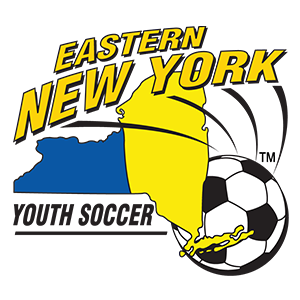
By Tim Bradbury, Director of Coaching, Eastern New York Youth Soccer Association
As we head into a new season, there are so many things, we all need to consider to make sure that we are putting the idea of “what is the best environment for our youth players to develop within” that I thought it may be worth reminding us all of a few of them.
For Players
- Play a game format that is best for the developmental level of the kids. Some 11- and 12-year-olds’ needs are best met by 4v4 or 7v7. Age is not the best way to choose game format.
- Appropriate competition level. Based on skills performed and tactics mastered, perhaps a group are level to travel and play against other teams and perhaps they should just compete within a club level.
- Traveling distance. It makes absolutely no sense for a group of young players to spend more time on car ride than they do playing the game. When this equation gets to the stage where they spend four times more traveling than they do playing at 8 and 9 years of age, something is terribly wrong. We are teaching them to be better at sitting in a car and getting quizzed by mom and dad about performance than we are playing the game.
- Parent engagement programs. The time is long past that clubs and leagues should have well established parent engagement programs that help them develop a basic knowledge of the game, how players learn and how they can best support the process.
- Be transformational and not transactional. Remember, you work with young children and their parents so build environments that go way beyond just kicking a ball.
For Coaches
- Have a definite plan for the season for both team development and individual player development based on how best to help them become more skilled and knowledgeable about the game while having fun.
- Reconsider the place of winning and how important it is at 8,9,10,11,12 13 14 etc. to win every game. When winning gets to become the most important thing of all, development gets sacrificed.
- Remember that you are a role model and if you scream and shout at refs, other coaches and your players, then your parents and players are likely to do the same.
- Have a personal development plan that focuses on how you intend to use the experience of the season to become a better coach to better serve the players you teach.
- Work to ensure that the club you coach within is working to become a true club with a well-defined mission statement, club philosophy, club style of play that your players and teams can thrive within.
For Parents
- Remember that you have a vital role to play in your child’s development and that their soccer journey can be one that helps them develop life skills like grit, resilience, and honesty. Perhaps more important than winning a few trophies.
- Work to better understand the game and how your child learns so that you can support the coach and the learning opportunities presented.
- Remember that you are a role model and if you scream and shout at refs, other coaches, and other players, then your child is likely to do the same.
- Work on treating all refs, coaches and other parents with respect and kindness. Imagine how great it could be if all parents worked on the same footing.
- Most of all, avoid shouting orders as your kid tries to solve the many problems of the game. You do not see what they see, have the athletic abilities they do or the soccer skills and acumen they possess so how can you possibly be giving them sensible information?

